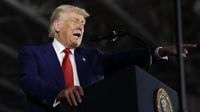In a surprising twist that has sent shockwaves through Hollywood, former President Donald Trump announced on Sunday evening his intention to impose a 100 percent tariff on movies produced outside the United States. This bold statement has sparked a flurry of reactions from industry insiders and raised serious concerns about the potential impact on the U.S. entertainment sector.
Trump's tariff proposal comes amidst growing fears that the American film and television industry is facing a significant decline. According to a report from the Motion Picture Association (MPA), the U.S. entertainment industry boasted a $15.3 billion trade surplus as recently as 2022. However, the proposed tariff could disrupt this balance, leading to increased costs and production volume reductions. Experts warn that such a tariff scheme would not only violate World Trade Organization rules but also provoke retaliation from other nations, potentially igniting a trade war that could devastate an industry already struggling to compete globally.
As Trump’s announcement reverberated through Hollywood, industry professionals expressed their alarm. "WTF dude kill me now," read one text message from a concerned filmmaker, while others questioned the viability of their projects, with comments like, "My show is written and posted in L.A. but shot in Vancouver???" and "Animation apply here? Any idea??" The general sentiment among Hollywood executives is that Trump's remarks were less about policy and more about drawing attention, as he often uses provocative statements to shift media focus.
Meanwhile, the production landscape has already shifted dramatically over the years. Data from Luminate reveals that from 2022 to 2024, there were 241 American films released with budgets of $30 million or more, but only about a third of those were filmed in the U.S. This trend reflects a broader pattern where filmmakers increasingly seek out cost-effective alternatives abroad, with countries offering taxpayer-funded incentives to lure productions away from Hollywood.
In this context, Trump's comments about the U.S. movie industry dying a "very fast death" resonate with many. While he may not fully grasp the complexities of the industry, his recognition of the challenges facing Hollywood aligns with the experiences of many in the field. Notably, high-profile figures like Mel Gibson and Sylvester Stallone have opted to film overseas, highlighting the competitive edge that international locations now hold.
In a related development, Australian Prime Minister Anthony Albanese recently engaged in a "very warm" conversation with Trump, discussing tariffs and the AUKUS security pact following his election victory. Albanese's remarks on May 5, 2025, reflected optimism about future relations, noting, "I had a warm and positive conversation with President Trump, just a short while ago... We talked about AUKUS and tariffs." This dialogue comes as Australia grapples with the implications of Trump's "liberation day" tariffs, which include a 10% levy on Australian goods and were announced during the election campaign.
During a press conference on the same day, Albanese expressed his commitment to maintaining an orderly government and a positive agenda, emphasizing the importance of representing Australia’s national interests. He noted that he had also spoken with leaders from Papua New Guinea, New Zealand, France, and the UK, and is scheduled to connect with the presidents of Indonesia and Ukraine soon.
However, Trump’s relationship with Albanese has drawn scrutiny, especially as the Liberal party leader, Peter Dutton, has been criticized for echoing some of Trump’s policies during the campaign. Dutton's portrayal of the Albanese government as being unable to leverage its diplomatic ties with the U.S. effectively has intensified scrutiny of Labor’s approach to international relations.
Despite the challenges, Albanese remains optimistic about Australia's future, asserting, "If we get this decade right, we can set Australia up for the many decades ahead." His administration's focus on reducing inflation and increasing wages and employment reflects a commitment to economic stability, even as the specter of Trump's tariffs looms large.
As both the entertainment industry and international relations evolve, the implications of Trump's tariff proposal will likely continue to unfold. For Hollywood, the stakes are high, with the potential for significant economic repercussions. The industry is already grappling with a shifting production landscape, and any additional barriers could exacerbate the challenges faced by filmmakers and studios alike.
In the coming weeks, as Trump and Albanese potentially cross paths at the G7 summit in Alberta from June 15-17, 2025, the discussions surrounding tariffs and international trade will be closely watched. The outcome of these talks could have lasting effects on the U.S. entertainment industry and its global standing.




